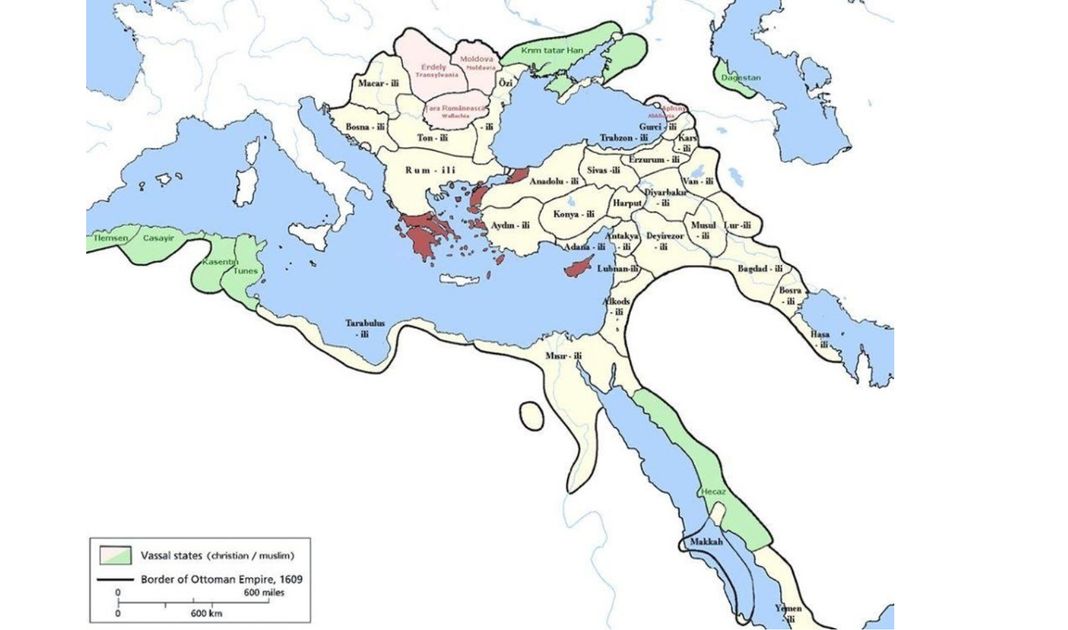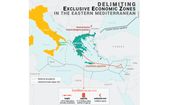Turkey’s New Global Posture: Grand Strategy and Geopolitical Imperatives. Part III

(wikipedia.org)
Turkey as a gendarme of the Greater Middle East
We’ve seen changes in U.S. foreign policy – the geopolitical pivot to the Pacific – and the U.S. needs someone who is able to keep an eye on the Greater Middle East through an American lens. It seems that they didn’t find a better candidate than Turkey for this role and Turkey is not against such a scenario. However, there have been many objections from Southern European NATO members and U.S. allies in the Middle East. For Washington it is not going to be an easy choice.
The Arab World mostly tries to unite against Turkey and Qatar (its main ally in the Persian Gulf). Russia feels the divided-ness in the sophisticated system of U.S. allies in Europe and the Middle East over the future role of Turkey in the region and uses this for its own advantage. Interestingly, Ankara itself does not think in terms of regional categories; on the contrary, it sees itself as a global player.
Leadership in the Muslim world
The World Muslim Ummah needs a leader and needs an ideological and geopolitical pillar of Muslim Civilization. Yet Samuel Huntington in his Clash of Civilization was rationalizing about the future of the leadership in the Muslim world. He was right when he wrote that the Arabs are not going to agree to Turkish dominance in the Muslim world due to historical memories of Ottoman rule over the Arabs for centuries. Alas, unfortunately for the Arabs, Turkish power is spilling over the Anatolian peninsula and pouring out far beyond, especially into the lands populated by the Arabs.
Recently Erdogan has returned the status of the mosque to the Hagia Sophia. This was a symbolic element to the entire global Ummah and showed who is actually making really independent moves in the direction of an Islamic renaissance. For decades, the main Muslim grievance was that none of the world’s Muslim states conducted a foreign policy that aimed to restore what they think of as the genuine place of Islam. Strikingly, Turkey has now moved to finish with the secular state of Ataturk and will not alter its identity principles. In the XVIII and XIX century, Russia’s advance into the Caucasus and the Crimean Khanate created the prerequisites for the development in the Ottoman Empire of Turkish nationalistic ideology, because millions of refugees from these areas changed the internal politics of the country. These days, the Syrian Civil War has partially preconditioned changes in the Turkish national ideology. It is switching from Turkish nationalism to Islam as its main ideological foundation. Thus, it is possible to assume and predict that in the upcoming decades, Turkey’s Islamization will only increase and Turkey will attempt to be a leader of the Muslim world sooner or later. Erdogan has repeatedly stated that only Turkey can be the leader of the Muslim World.
Additional evidence of the Islamization of Turkey’s global agenda is the country’s aggressive campaign against Saudi Arabia and Israel. Saudi Arabia is seen as Ankara’s main rival for the role of Muslim World leadership. This rivalry has a deep history due to the Battle of Mecca in 1916, when the Ottoman Caliphate was deprived of the rule over the two holiest cities in Islam – Mecca and Medina – with help of Western powers. This was the beginning of its demise and in Turkey, it was considered nothing other than a betrayal of Islam by the Arabs. Erdogan’s leadership over the Muslim world is especially visible regarding Palestine and Jerusalem. Turkey has reacted aggressively against Israeli or American plans to settle the Palestinian question without Muslims’ consent. In Israel, many are nervously observing the rise of the new Turkey and its ability to project power, underpinned with religious-universalistic ambitions.
The factor of the Muslim Brotherhood plays a non-direct but important role for understanding the grand strategy of Turkey in the next decades. The Civil War in Libya is to some extent the continuation of a religious and ideological battle between different factions of the Muslim Ummah of the Middle East. The grand ideological foundation of the Muslim Brotherhood is connected with Islamic Modernism – they are ready to accept industrialization but they are not ready to give up the ideological principles of Islam. Additionally, they believe that the Muslim states are ruled by western imperialism, hence they must be liberated. It is unclear how deep are the ideological similarities between the Muslim Brotherhood and Turkish AKP Party, but it is possible to see the AKP’s dynamism in implementing a strategy that combines both the elements of Islamization and industrialization.
The geopolitical rift in the Middle East between regional fractions is happening partially because of the ideological factor. The most striking example of this is the case of Libya and Egypt. Relations between the Arab World and Turkey had a constructive character for most of the time until the Arab Spring and the rise to power in Cairo of Mohamed Morsi from the Muslim Brotherhood, followed by his arrest and execution by the new President, which marked a turning point of divergence between two fractions in the Middle East. Interestingly the confrontation between Egypt and Turkey over Libya echoes the old times when Mohammed Ali the ruler of Egypt challenged the Ottoman Empire in the XIX century and only the direct interference of Russia saved Constantinople from defeat. During the Egyptian–Ottoman War (1831–1833), after the fall of Acre (a city now located in the coastal plain in the north of Israel), Mohhamen Ali continued on to win control of Aleppo, Homs, Beirut, Sidon, Tripoli and Damascus. The battles in the territory of Libya had serious consequences for the entire war between the two states.
Ukraine and the Black Sea Region
The determination of Turkey towards the western terrains of Desht-i Qipchaq (the Pontic Steppe) which we now know as the Northern Black Sea Region, from the Sea of Azov to the Danube, does not have such importance as it had historically. However, the Turkish geopolitical imperatives are as follows:
- Ukraine – or what is left of this country – must remain independent, especially the zone from Crimea and the Dnieper River Delta to the Danube. The Russians do not have control over this last piece of the Ukrainian coastline. Odesa must be under Ukrainian control. The symbolic presence of NATO is highly desirable now and for many decades;
- The existence of an independent Bulgaria and Romania is important to Turkey as a factor of stability in the region, but at the same time, if NATO or U.S. cohesiveness is going to be undermined by different factors, the role of Turkey in these countries will be increasing. It is already visible that a “sharp-toothed” Turkey is scaring all Turkish neighbors, not only Greece but also Bulgaria and Romania;
- It is impossible to exclude the scenario in which the statehood of Ukraine will be under threat – external or internal. Turkey can then propose to establish its military and naval presence in certain strategically important Ukrainian chokepoints: the Danube and the Dnieper Deltas, Odesa or Kherson. On the other hand, Moscow deeply feels Turkish security concerns and it is possible to assume that Moscow would try to avoid confrontation with Turkey, at least in the near future – they need each other;
- The independence of all countries from Georgia to Moldavia has strategic importance to Turkey. The buffer zone between Russia and Turkey must be preserved;
- Turkic origin minorities (Crimean Tatars and other Tatars in Eastern Europe, Gagauzes, Meskhetian Turks, Georgian Muslims, Circassians,) in the regions must be under the constant supervision of Turkey;
- The Turkish economy must be dominant in the countries of the entire region;
- The Montreux Convention must be maintained as a guarantee of regional stability, at least until the completion of a new canal through the Bosporus;
- The policy of non-recognition regarding Crimea and demand for the territorial integrity of Ukraine must be continued;
- The economic stability of the region is crucial for the Turkish economy;
- In the Southern Caucasus, a continuation of the policy of supporting Azerbaijan as a strategic ally in the region and avoiding direct confrontation with Moscow and Tehran. Direct military participation on the side of Azerbaijan will immediately push Iran and Russia into closer cooperation in order to secure the balance of power in the region;
The Middle Eastern Geopolitical Imperatives of Turkey
In the Middle East, we are witnessing the formation of alliances of one power against another. The linchpin of the geopolitical reshuffle is not actually Russia, as it is possible to assume, but Turkey. For the United States, Ankara created a big problem owing to the fact that all the above-mentioned countries are traditional U.S. allies. They together were fighting against the Soviet Union, but in the XXI century, they have demonstrated a readiness to use force against each other in order to defend national interests.
The Libyan conflict has a geopolitically different nature than the Syrian one. The main difference is that Libya’s geopolitical position is much more important than Syria’s for the EU’s southern frontiers, meaning that the countries of the EU could not watch silently when the “power vacuum” was filled not by jihadists or dictators but by superior great powers (Turkey and Russia). The greatest problem is that this conflict has divided NATO allies and complicated relations between the Europeans and the U.S. over the role of Turkey in the post-COVID correlation of forces in the Mediterranean. Russia’s role here is important but it would be a grave mistake to see things through ideologically blinded glasses.
All conflicts in the Greater Near East have happened in the domain of former Ottoman Empire terrains (Yemen, Ukraine, Libya, and Syria). Turkey now has a military base in Qatar, an established military presence in Idlib (more likely it will be part of Turkey as a Golden Heights) and Northern Syria, and now it is the turn of Libya. It is possible to assume that eventually, Turkey would like to have a military base in the terrain of the Pontic Steppe (Ukraine). And why not… Turkey is a NATO country and a rival of Russia!
The main conclusion of the main Middle Eastern conflicts is that they are happening in the all-terrain of the Greater Middle East, from Yemen to Libya and from Syria to Ukraine (Crimea and Donbas). All the long-lasting conflicts determining the Greater Middle East nowadays are happening in the areas of former Ottoman Empire territories.
Thus, it is so symbolic that Russia and Turkey are the main players that set the rules in these terrains.
- Ukraine: Podolia Eyalet, and the Crimean Khanate (Kherson, Donabas), Silistre Eyaleti (parca Özü Beylerbeyliği), Kefe Eyaleti.
- Libya: (Tarabulus Ili);
- Yemen: (Yemen Ili);
- Syria: (Antakiya ve Diyarezor Ili);
It is extremely interesting how the power of national dignity and myth can survive and bring countries in the same direction as they were once. It’s a shame for small and weak countries – once the history has given us the chance to develop strong countries, but we, it seems to me, miserably failed and therefore we will be gloatingly absorbed eventually. In order to finish, I would recall the history when the European powers several times overslept during the rise of challenges as in the case of Germany and Japan. This time they overslept over China, Russia and Turkey, but compared with previous times, the West was never so weak as it is now, both externally and internally.
Autor
Ridvan Bari Urcosta
Senior Analyst at Strategy&Future






Trwa ładowanie...